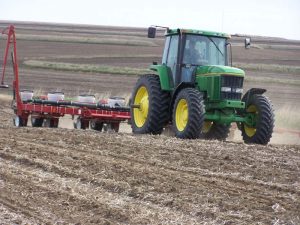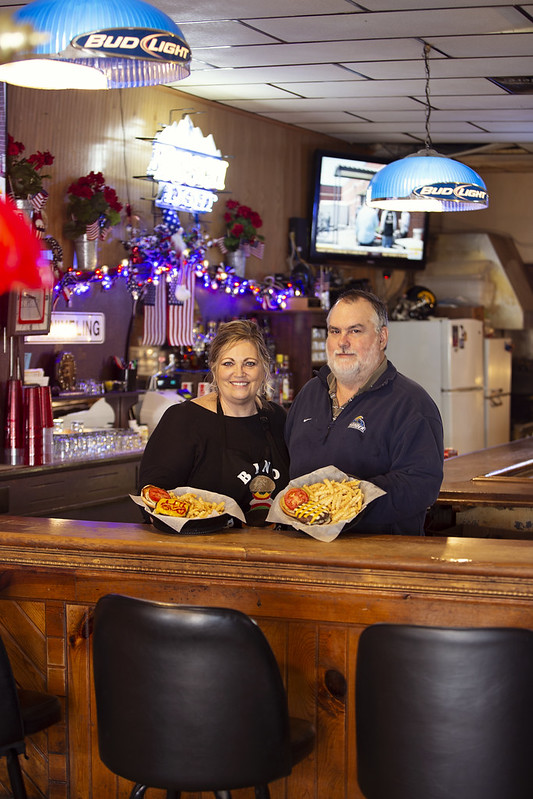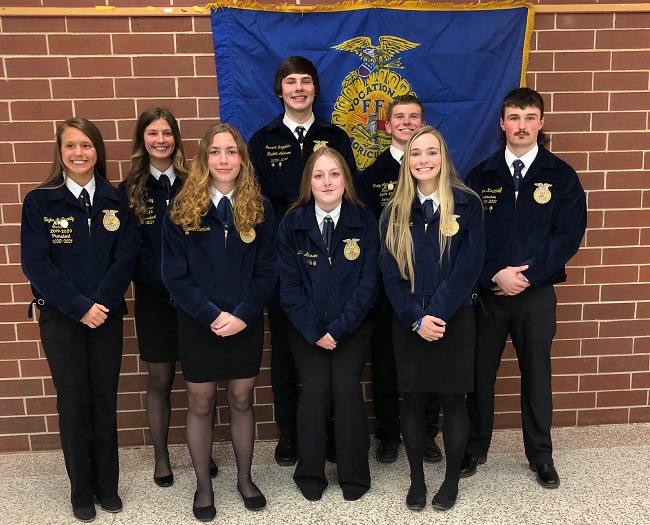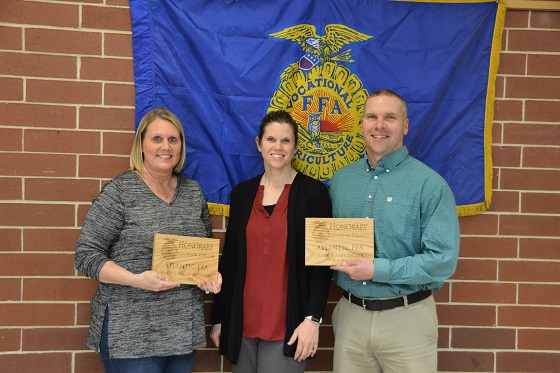CLICK HERE for the latest market quotes from the Iowa Agribusiness Network!
CLICK HERE for the latest market quotes from the Brownfield Ag News Network!
CLICK HERE for the latest market quotes from the Iowa Agribusiness Network!
CLICK HERE for the latest market quotes from the Brownfield Ag News Network!
(Radio Iowa) – Dry conditions allowed farmers to spend a lot of time on the tractor last week. The new U-S-D-A crop report shows nearly half of the state corn crop was planted in the last week — taking the percentage from 20 to 69 percent completed. The fast pace now puts the corn planting nine days ahead of the five-year average.
 There were plenty of beans in planters as well. The percentage of soybeans planted moved from six to 43 percent in the last week. The bean planting is now 12 days ahead of normal.
There were plenty of beans in planters as well. The percentage of soybeans planted moved from six to 43 percent in the last week. The bean planting is now 12 days ahead of normal.
(Radio Iowa) – The U.S. Environmental Protection Agency has rescinded three waivers that had excused Sinclair Oil refineries in Wyoming from the federal requirement to blend ethanol into gasoline. Iowa Renewable Fuels Association executive director Monte Shaw says the waivers were granted on the last day of the Trump Administration. “What was most shocking about them, not just the lateness of them and they aren’t justified to begin with, but these refineries are in the 10th circuit court,” Shaw says.
The United States Court of Appeals for the 10th circuit has jurisdiction over six states, including Wyoming. It’s the court that ruled early last year that small refineries only qualified for the exemption from blending ethanol into gasoline if they had applied for extensions of waivers originally granted in 2010. Shaw says the E-P-A’s decision fits with the law, but just as importantly it matches what candidate Joe Biden said on the campaign trail. “He said he wanted to reign in these refinery exemptions, that they weren’t justified, that we need to follow the law and implement it appropriately,” Shaw says, “so for his EPA then to turn around and say: ‘Hey, these literally last minute exemptions don’t make sense. We need to pull them back,’ it makes sense because that is what he said he would do.”
Shaw says the Biden Administration’s E-P-A administrator will be in Iowa today (Tuesday) and will tour an ethanol plant. “Unfortunately I guess for him the previous administration left a lot of unfinished business on his calendar and that will include finally enforcing the small refinery waiver program appropriately,” Shaw says. Other unresolved items include setting the federal ethanol production mandate for this year and announcing E-P-A labeling and equipment rules so retailers can sell E-15 — gas with 15 percent ethanol — year round.
In celebration of “May Beef Month,” the Iowa Cattlemen’s Association and Iowa Beef Industry Council are excited to announce the results of Iowa’s Best Burger contest. Bambino’s, in Ossian, has been awarded this year’s Iowa’s Best Burger honors. At first glance, Bambino’s appears to be a hole-in-the-wall, nestled between Decorah and West Union. Customers having visited the quaint Ossian establishment, before or after it had ranked among Iowa’s Best Burgers, would concur—there is more than meets the eye.
Ron Lienau, of Fredericksburg, IA, purchased the bar in 1982. He and his girlfriend, Sue, decided to embark on this journey together, but “for a little while; not too long.” One year later, Ron and Sue wed. Soon after, the couple started their family, having four boys in five and a half years. “We were hoping to sell when our youngest was in Kindergarten,” Sue recalls. “Thirty-nine years later, and we’re still here.” The Lienau’s raised all four boys, while managing the bar and growing their business. Sue’s bar shift offered flexible hours, allowing her to attend the boys’ sporting events. As they grew older, all four boys worked for the family-owned business. Sue is proud of her boys, as they gained both cooking and social skills from their food service experience. She is now teaching her grandsons how to wash glasses and assist customers.

 Bambino’s, which mimics Ron’s college nickname, was “truly a bar,” at first. However, Sue says “food became a bigger demand over time.” When the restaurant in town closed, it left townsfolk without a place to dine. Bambino’s, which did not feature a service kitchen at the time, found a way to open early and serve breakfast. Sue cooked at home, then brought her breakfast items to the bar to serve. Eventually, a new restaurant opened and Bambino’s stopped its breakfast service, but continued with its noontime meal. “Throughout it all, we have had a good noon meal,” Sue says. “My meals are always made from scratch.”
Bambino’s, which mimics Ron’s college nickname, was “truly a bar,” at first. However, Sue says “food became a bigger demand over time.” When the restaurant in town closed, it left townsfolk without a place to dine. Bambino’s, which did not feature a service kitchen at the time, found a way to open early and serve breakfast. Sue cooked at home, then brought her breakfast items to the bar to serve. Eventually, a new restaurant opened and Bambino’s stopped its breakfast service, but continued with its noontime meal. “Throughout it all, we have had a good noon meal,” Sue says. “My meals are always made from scratch.”
To date, Bambino’s has continued offering noon specials, including: hamburger steak on Monday, roast beef meal on Thursday, and chef’s pick on Friday. “We do more food business than bar business,” Sue shares. “Beef, all around, is our biggest seller. It’s in our goulash, meatloaf, and soups.” Aside from the daily lunch specials, “cheeseburgers and fries have been customers’ go-to.” Bambino’s keeps busy with burgers “all day and all night,” as farmers call in for a no hassle, utensil-free lunch, bowlers seek out a quick meal on their drive back from league night, and softball players round out a long evening. Bambino’s burgers are highly sought after, and “you can get them anytime.” Bino (Ron) will serve burgers from 9 a.m. to 2 a.m., attracting customers all throughout the day. Bambino’s burgers feature fresh, never frozen, 80/20 fine ground beef. Ron and Sue patty the 7-ounce burgers as orders come in. The burgers are then cooked to 160 degrees, placed on a fresh KwikStar bun, and customized.
Bambino’s most requested burger is the “veggie burger,” which features a juicy, all-beef burger patty topped with lettuce, tomato, pickle, and onion. Customers can customize their burgers anyway they’d like. Popular toppings include: bacon, egg, onion rings, and hash browns. Overall, Bambino’s customers “just like beef,” Sue says. “They’re beef eaters.” Sue enjoys unleashing her creative side, when building a burger. Not only does she create flavor, but fun. Regular customers and special guests may find a creative design made out of ketchup on their burgers during special occasions, such as birthdays and holidays. In her spare time, Sue continues to chip away at her children book series, which her customers helped inspire. The Lienau’s enjoy their customers, and the hospitality shown by Sue and Ron make Bambino’s a special place to dine. “Meeting new people and welcoming new visitors” has been the highlight of their Best Burger Contest experience. Unfamiliar guests become part of the Bambino’s family well before they step foot outside. The Lienau’s know no stranger.
The flavor, creativity, and hospitality, which abounds at Bambino’s, have helped this small-town establishment secure Iowa’s 2021 Best Burger award. The designation as Iowa’s Best Burger comes after a two-phase competition, sponsored by the Iowa Beef Industry Council through the Iowa State Beef Checkoff and the Iowa Cattlemen’s Association. The first phase is based on votes from the public. For a month, burger lovers went online and voted for their favorite Iowa burger joint. At the end of the month, the 10 restaurants with the most votes were declared the “Top 10”. From there, three anonymous judges visited each of the restaurants, scoring the burger patties based on taste, doneness, and presentation.
Bambino’s, located at 102 N Lydia Street, Ossian, IA, 52161, is open from 9 a.m. to 2 a.m. Monday through Saturday and 3 p.m. to 2 a.m. on Sunday. The establishment is 10 miles south of the Decorah Municipal Airport or six miles east of Calmar, right off Highway 52 on N Lydia St.
Information about the Atlantic FFA Banquet has been released. The Banquet was held on Monday, March 29th at the Atlantic High School. There were 150 members and guests were present at the event. The banquet started with the opening ceremonies, led by the 2020-2021 chapter officers. This year the officers include President Taylor McCreedy, Vice President Alyssa Derby, Secretary Craig Alan Becker, Treasurer Gunner Kirchhoff, Reporter Aspen Niklasen, Sentinel Wyatt Redinbaugh, and Student Advisor Garrett Reynolds. 2020-21 Chapter President Taylor McCreedy said, Ti was a great year despite all of the challenges the chapter had to navigate. We accomplished a lot, learned to adapt and succeed under circumstances that were different. Overall I think we had a great year”
The opening ceremonies was followed by a welcome to members and guests, and was given by President Taylor McCreedy. A reflection was then said by Craig Alan Becker. Following the reflection, dinner was held for members and guests alike. HyVee provided the Brisket and sides for the FFA members and guests. At the conclusion of dinner, two guest speakers spoke to the audience. The first was Shelby McCreedy, the mother of FFA President Taylor McCreedy. Mrs McCreedy talked about the importance of overcoming adversity as a group and building a better chapter in the long run. McCreedy also spoke about strength, resiliency and determination of this Chapter to continue to make things happen even while adhering to COVID protocols.”

2020-21 FFA Seniors: Left to Right Back Row -Taylor McCreedy Alyssa Derby, Garrett Reynolds, Craig Becker, Gunner Kirchhoff; Left to Right Front Row – Hannah Carlson, Bethany Anderson, Caroline Pellett.
The next speaker was Atlantic FFA Alumni Representative, Tyler Comes. Comes talked about the many possibilities for people to get involved with the Alumni organization. “There are many opportunities to get involved. Some examples include helping with fundraisers, driving FFA members to events when needed, and just finding ways how to help benefit our chapter.” Craig Alan Becker gave the secretary’s report. And the treasurer’s report was given by Gunner Kirchhoff. The balance on hand stated was $18,870.19.
Following the guest speakers, awards were given out. First were those recognized for earning 10,000 FFA points throughout their time as a member. These points are earned through getting involved with our chapter. The more activities and events a member participates in, the more points they earn. Those recognized for reaching 10,000 points included Craig Alan Becker, Hannah Carlson, Alyssa Derby, Taylor McCreedy and Garrett Reynolds. The next award was the Academic Achievement Award. This award is given to those who have been a part of the Atlantic FFA chapter for three years, and have maintained a 3.5 GPA throughout all those years. Those who received the Academic Achievement Award included Bethany Anderson, Craig Alan Becker, Hannah Carlson, Alyssa Derby, Gunner Kirrchoff, Taylor McCreedy, Drey Newell, Carloine Pellett, and Garrett Reynolds.
After the Academic Achievement Award came the Star Greenhand, Star Ag Placement, Star Ag Business, and Star of Ag Production Awards. The Star Greenhand is awarded to a freshman who the chapter officers feel was the most involved with the chapter in the past year. This year there were two outstanding Greenhand members so the award was given to Claire Pellett and Colton Becker. The next award, Star Ag Placement, is an award is given to a member that has done an exceptional job in their employment, whether that be in or out of agriculture. This award was received by Gunner Kirchhoff. Next came the Star Ag Business Award, which was given to Craig Alan Becker. Craig Alan was given this award for his outstanding work at his family farm operation. Following the Star Ag Business Award, Taylor McCreedy was awarded the Star of Ag Production. This award is given to a member who does an outstanding job in their work of agriculture production, while working on their own operation.

Honorary Chapter Farmer: Left to right – Shelby McCreedy, Abby and John Becker.
This year, the new officers for the 2020-2021 term elected four members to receive the Atlantic FFA Leadership Award, which is given in appreciation to those who have shown leadership through their years in FFA. These 7 members who received the award include Taylor McCreedy, Graig Alan Becker, Alyssa Derby, Hannah Carlson, Garrett Reynolds, Caroline Pellett and Garrett Reynolds Officers also elected 3 families and individuals to receive the Honorary Chapter Farmer award, which is given to people who have played a large role in helping the Atlantic FFA chapter and the activities they do. Those that accepted this award include Marty and Shelby McCreedy, John and Abby Becker, and Steve Barber Superintendent of Atlantic .
To finish the award recognitions, Taylor McCreedy and Bryan York were recognized for winning their state proficiency awards. Taylor competed in Diversified Livestock and Bryan competed in Vegetable Production. Four other Atlantic FFA members also competed in State Proficiency Awards: Gunner Kirchhoff placed 3rd in the state in his proficiency award area of Ag Mechanics, Caroline Pellett placed 3rd in Beef Entrepreneurship. Garrett Reynolds placed 4th in Ag Sales for his job at Fareway and Hannah Carlson placed 5th with her Goat entrepreneurship. These proficiency awards are given to members who have an outstanding Supervised Agriculture Experience (SAE) project.
This year, 14 members were given the Discovery Degree. The Discovery Degree is awarded to members who are finishing their 8th grade year of schooling, and have been involved in FFA for one year. Those that have been involved for one year of high school Ag, received the Greenhand Degree, which was given to 16 members. Next came 11 members who were Chapter FFA degrees, which are given to members who have been involved in FFA for 2 years since being in high school, or members who have been in FFA for three years including their 8th grade year.
The banquet concluded with the installation of new chapter officers. For the upcoming 2019-2020 year, the new officers include the following: Wyatt Redinbaugh as President, Cooper Jipsen as Vice President, Bryan York as Secretary, Dylan Comes as Treasurer, Aspen Niklasen as Reporter, Logan Eilts as Sentinel, and Malena Woodward as Student Advisor. Chapter President Wyatt Redinbaugh said “The 2021 FFA Banquet was a strange experience for me, it marked the end of the seniors leadership and time for our class to step up. This senior class has influenced me in so many different ways. I am excited to see what I can do to help build this FFA chapter for the future.“
(Story credit: Aspen Niklasen, Atlantic FFA Reporter)
Atlantic FFA Advisor Eric Miller reports, that on Monday, April 26th and Tuesday April 27th, Atlantic FFA members Malena Woodward and Bryan York participated in the 10th annual Virtual Iowa Youth Institute (IYI) hosted by the World Food Prize Foundation. Woodward and York were part of the 264 students and 110 teachers from 93 Iowa high schools. This virtual, 2 day-long event was the first of its kind for the IYI supported by over 90 experts from across Iowa.
Each year, the World Food Prize Youth Institutes convene high school students, teachers and experts to explore and solve local, national and global hunger and food security issues. In order to be a part of the Iowa Youth Institute, students research and write a paper on a global challenge related to hunger and food insecurity. Currently, 25 states, the Netherlands and Honduras host Youth Institutes, where students can be selected to serve as delegates at the Global Youth Institute as part of October’s Borlaug International Dialogue.
Woodward’s paper was on the malnutrition problem occurring in Guatemala. Woodward said, “I had fun researching and learning more information about Guatemala. After learning that over half of their population is malnourished I feel it is important to educate the local population on nutrition and producing their own food.” York’s paper focused on Sustainable Agriculture in Tanzania and how this affects the food insecurity problem. “I was interested in soil health and Sustainability overseas. After Doing a bit of research, I decided to write my paper about Tanzania, a country who has been on the raise in recent years, but has had trouble with its malnutrition and infrastructure.” York stated, “I found, in my research, that Tanzania can produce almost 95 percent of its own food. But, many Tanzanians have trouble accessing this food inside its borders.”

Malena Woodward

Bryan York (Photos submitted)
The day began with remarks from Kelsey Tyrell, Organizer for the Iowa Youth Institute and Wendy Wintersteen, President of Iowa State University. The keynote address was provided by Kim Reynolds, Governor of Iowa. Once the opening session was complete Woodward and York began Roundtable Discussions. Students presented their research in a roundtable fashion to ISU faculty and industry professionals by using Zoom Meetings. Students were also supportive of their peers and asked questions to provide a diverse array of perspectives to the discussion. During the afternoon session students and teachers participated in virtual Immersion Discussions with World Food Prize Partners.
At the end of the second day, Woodward and York were declared Bourlag Scholars and awarded a $1,000 scholarship to Iowa State University College of Agriculture and Life Sciences. Both Woodward and York are going to be Seniors next year and have the opportunity to participate again. When talking about her experiences Woodward said, “I really enjoyed the presentation. I thought it was interesting hearing the ideas of other students and experts trying to solve world hunger as well as hearing their input and giving me more ideas about my topic.”
This one-day event is offered at no cost to teachers or students. More details are available at www.worldfoodprize.org/iowayouth.
(Radio Iowa) – Growers planting the traditional corn and bean crops in the state have a pretty conventional process — while industrial hemp growers face a lot more questions. Robin Pruisner from the Iowa Department of Agriculture says there are four options for most hemp growers. “So you have to kind of figure out what you’re growing before you start — which is different from what we have with our normal crops in Iowa. Typically with corn, you raise it and then you can decide if you are going to sell it to a feed mill or an ethanol plant,” She explains. “Hemp is a little more complicated than that and you have to start planning earlier.”
With hemp you can grow it to extract the C-D-B, to create seeds, for grain, or for fiber. Pruisner says the different uses cause growers to use different methods in tending those crops. “You will see an incredibly wide spectrum of fertilization techniques and products out there — with some people not fertilizing at all. Others investing in very specific products to their crop,” Pruisner says. Pruisner says the cost of the inputs used for the crop are also varied. “Depending on whether you plant seed and if it is feminized seed — it can cost a dollar or more a seed. And it can cost a lot less if it is not feminized. And if you are planting clones or seed starts — they can run as high as five dollars a piece. And then you have you labor and planting costs,” Pruisner says.
Weather conditions are a factor for all crops — including hemp. “Once its established, it likes it on the dry side. It is not uncommon to see people irrigating if they are going for the high-value flower crop for extraction,” according to Pruisner. “It is also not uncommon to just see it planted out in the farm field with no irrigation. I really do see it from Alpah to Omega the way people are raising it.” Pruisner says hemp growers do not want wet conditions around harvest time because that can cause the plants to get moldy.
(Radio Iowa) ) The rare and powerful derecho that rampaged across Iowa last August caused extensive damage to hundreds of thousands of trees, but not all of the wind storm’s damage was negative. Billy Beck, a forestry specialist at the Iowa State University Extension, says the state’s woodland owners -can- recover and make their forests even more resilient than before. “We want to treat this as a forest management opportunity,” Beck says, “and not like an insurmountable setback.” Much like a wildfire can help a forest by clearing out dead trees and undergrowth, the derecho has provided the chance to rebuild some of the state’s key woodlands.
Beck notes oak trees, which are important to Iowa’s environment, love the sunlight. “They actually rely on disturbances such as this that open canopies up and expose young seedlings to sunlight to keep their species on the landscape,” Beck says. “If not, if the canopy closes, a lot of other species that love shade, still good trees but not oaks, will creep up in the understory and eventually take over the canopy.” Diversity is vital in a forest, Beck says, and that includes diversity of species, age, size and structure, as well as distribution on the landscape. He says one plot of forest land in Linn County is a good example of how diversity helped during the derecho.
“This particular property had a lot of younger plantings, a lot of middle age plantings, and some older established forests,” Beck says. “The older established forests were hit pretty hard but the younger and middle age stands of trees that were planted were not. So, this person, although they had some damage, has a forest resource for the future because of their management efforts.” Beck is releasing a series of four short YouTube videos that explain how woodland owners can rebuild after the destructive storm. “There’s really no cookbook method to rebound,” Beck says, “so what these four initial videos were really doing is giving folks a general overview of some big concepts to start thinking about, some resources that are out there that can help them, and just some things to keep their eyes open for following storms.”
Next, Beck plans to release several longer videos that offer more detail about how to start over with woodlands. Iowa has nearly three-million acres of forestland, and saw one-and-three-quarter million acres of forests, wind breaks and urban canopies impacted by the derecho. Iowa’s forestry industry supports 18-thousand jobs and pumps nearly five-billion dollars a year into the economy.
Link to the first of four videos: https://www.youtube.com/watch?v=XkvaCJrLxMo
(Radio Iowa) – The chairman of a key committee says a complicated proposal to expand use of ethanol and biodiesel in Iowa hasn’t been killed for the year, but Senator Dan Dawson says it’s not greased for passage either. “What the future looks like, I cannot tell,” Dawson said. “…There’s a lot more work to be done on this before we find any consensus.” Dawson was among a handful of Senators who listened to feedback on the plan for about an hour yesterday (Thursday). It began with Logan Shine, an advisor to Governor Kim Reynolds, suggesting critics were spreading misinformation about what Reynolds has called a Renewable Fuels Standard for Iowa.
“I know we’ve all heard this is a mandate,” Shine said. “At this point, we’re disagreeing on the semantics of whether it’s a mandate, a standard — it simply doesn’t matter because this is a pro-Iowa bill.” A major pipeline company, truck stops, convenience stores and other retailers who sell fuel oppose the bill. Jason McDermott is president of McDermott Oil Company in Cascade, which operates five gas stations in eastern Iowa. McDermott says bill backers are misleading legislators about the significant expense of installing equipment that can pump higher blends of ethanol and biodiesel.
“For us as retailers, we’re not going to sell any more gas,” McDermott said. “We’re moving from one product to another. There’s absolutely no return on this investment and we’re the only ones being asked to invest in this.” Tom Brooks, general manager of Western Dubuque Biodiesel in Farley, says it’s time for legislators to take a stand in favor of the renewable fuels industry.
“Frankly we’re overdue for biodiesel and ethanol blends to be the standard here rather than the alternative,” he said. “This industry is way too important to Iowa. This really should’t be a difficult question.” Ken Kleemeier, vice president of fuels for Kum & Go stores, says while retailers have major concerns, the real victims of the bill will be drivers who’ll wind up paying more for gas and diesel. “The mandates and government overreach contained in this bill are a step too far,” he said.
Michael Walz of POET, which operates seven ethanol plants in Iowa, says the most important part of the bill ensures consumers have access to E-15 by 2026. “We believe every Iowan should have the freedom to fuel up with E15,” he said. “More than a decade ago, Minnesota led the way in making E10 America’s fuel standard. We believe Iowa should lead the way to shift to E15 with passage of this bill.”
Tom Cope, a lobbyist for Casey’s General Stores, says a proposed tweak in the bill designed to address retailer’s concerns is worthless. “This new version continues to have restrictions and things in place that are really going to upend the fuel market in the state of Iowa,” Cope said. Republican House Speaker Pat Grassley says there’s been hard work to try to find a satisfactory compromise, but it’s unlikely the legislature will pass an Iowa renewable fuel standard this year. “I can’t tell you the exact outcome of it, but it’s a difficult push,” Grassley said. The push toward adjourning the 2021 session has begun.
Today (Friday) is the last day legislators get a stipend to cover daily expenses, but it is common for the legislature to meet for days, even weeks, past that mark.
The latest data from the U.S. Drought Monitor shows worsening drought conditions in Iowa. On Thursday, new data showed a nearly 35% increase in areas considered abnormally dry, including much of central Iowa in the last week. Two areas of northern Iowa counties are considered to be in moderate drought, while a pocket of northwest Iowa counties is in severe drought. Those areas grew by nearly 7%.
 Counties in far southeast and far southwest Iowa show normal conditions as farmers are working to plant crops. The U.S. Drought Monitor releases new information on soil conditions each Thursday.
Counties in far southeast and far southwest Iowa show normal conditions as farmers are working to plant crops. The U.S. Drought Monitor releases new information on soil conditions each Thursday.
(Radio Iowa) – Iowa Pork Producers held several events in Sioux City and the surrounding area Wednesday. Aaron Juergens, of Sunburst Family Farms near Carroll, is the southwest director of the Iowa Pork Producers Association. He says the past 12 months have reminded them of the importance of community, and he says there are still challenging months ahead, and everyone must continue working together to keep people safe. Juergens also thanked Sioux City for supporting pig farmers.
The Pork Producers gave away 11-hundred pork loins in the parking lot of the Sioux City Explorers baseball team.”That’s approximately five-thousand-500 servings of pork. Each pound of pork is four servings of protein — so that’s nearly 22-thousand meals for this area’s residents,” Juergens says. He says they are also providing pork coupons at local grocery stores and pork appreciation baskets to some of the first responders.
The Food Bank of Siouxland and the Sunnybrook Church of Hope Center Pantry also received pork donations. Sioux City’s Seaboard Triumph pork plant is one of the largest pork processing plants in the country.